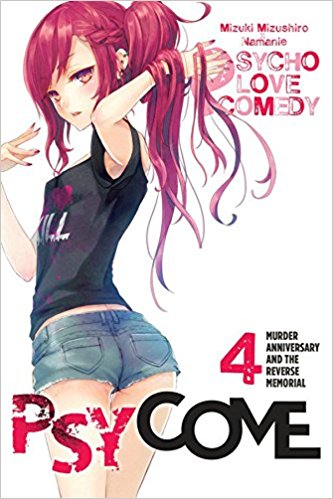By Mizuki Mizushiro and Namanie. Released in Japan by Enterbrain. Released in North America by Yen On. Translated by Nicole Wilder.
It is somewhat odd that I feel reassured at Psycome’s lack of ambition. At heart, this is meant to be a broad comedy, and as such it can’t give in too much to its premise. Despite having an innocent man in a prison devoted to making teen murderers into assassins, despite befriending a truly insane timebomb of a gas-mask wearing girl, despite finding out that your little sister seems to be genuinely disturbed… despite all that, the tone of this series has been light. Everything skews towards the cliche, towards the trope, towards the predictable. And yet you don’t really mind, because despite its flaws it’s sort of fun. That especially holds true for the 4th book, where we meet Eiri’s family and find they are a machine-gun nest of cliches.
Eiri herself is already quite the cliche, ticking off all the tsundere boxes very neatly. In case you think that she earned marks good enough to be able to leave the school, save your breath: she came in second to last, beaten only by the mohawk guy who spent the midterms in the nurse’s office. But her family have called for her, and so she must go. They’ve also asked for Kyousuke, which she finds disturbing. As for Ayaka and Renko, their grades WERE good enough to let them go outside for the reward, so they come along as well, because leaving Kyousuke and Eiri alone together is unthinkable. (Sorry, Maina, you’re just not important enough, though you do get the cover of the next book.) So everyone’s off to visit Eiri’s palatial home, which has the inscrutable mother, the little sister whose love for her sibling has turned to hatred, and the big brother who is creepy and a bit of a pervert. Oh yes, and murderous twin 9-year-olds, one male, one female, who are at least not named Hansel and Gretel. Eiri’s been called back home to try to solve the big problem: her inability to kill.
The climax of this volume is actually a giant anticlimax – by design, to be fair – and so most of the meat is devoted to the relationship between Eiri and her younger sister, Kagura. The moment you see Kagura and she attacks Eiri, you can see the entirety of her plotline laid out from end to end, and sure enough it’s all there – the hero worship, the frustration at being second best, the anger at being second best to an assassin who can’t kill. And of course the buried love she still has for her sister, which ends up coming out even after Eiri refuses to kill an innocent child to prove herself. The point of this book is to get Eiri – and by extension her family – to admit that it’s not that she can’t kill but that she doesn’t want to – that she finds it wrong. This is tied into the murder of her father as a child – Eiri felt the agony of her father’s death and her subsequent grieving, and even though she wants revenge, every time she made the attempt she though of others going through that and stopped. It’s good character development. Honestly, it’s more earned than the “I guess I do love you” tacked on at the end, which seems designed to keep things on a more even keel romance-wise – Kyousuke having spent much of the volume wondering if he really does love Renko.
Psycome is never going to be “really good”, but it’s still reasonably funny, and I like many of the characters. And we keep getting hints of the endgame plot, which I suspect will happen in the final volume. Recommended if you don’t mind cliches.

